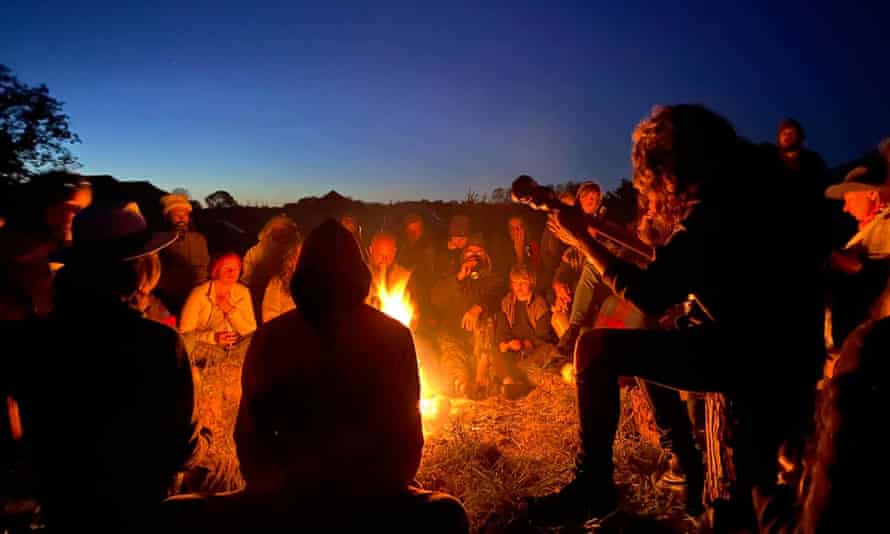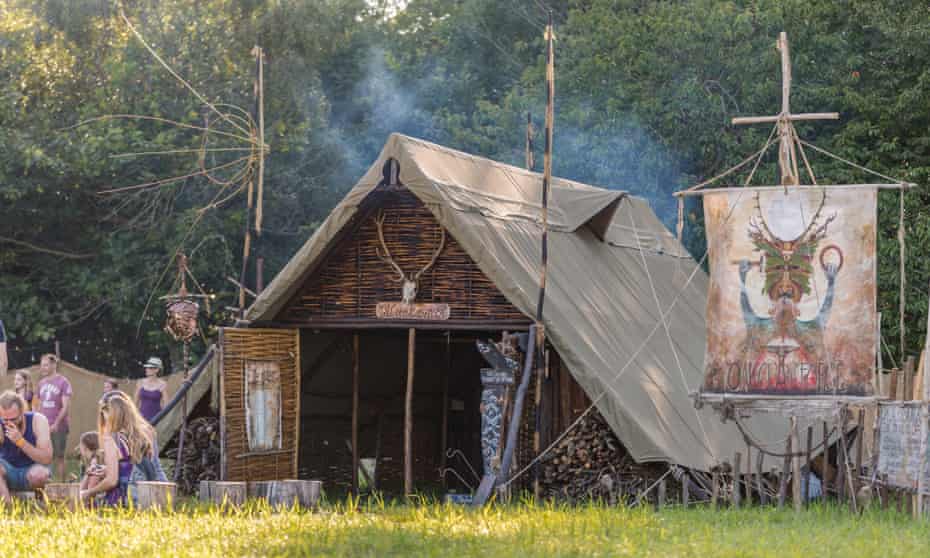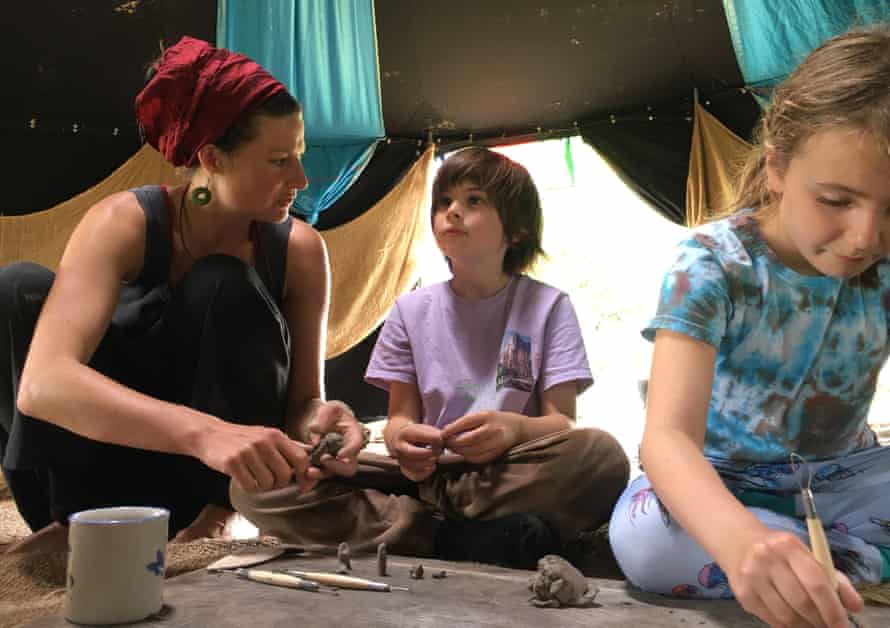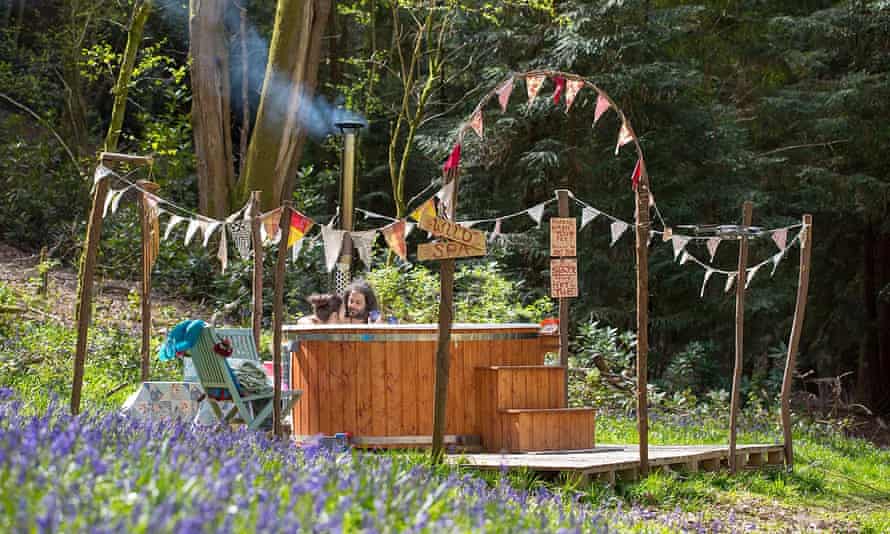It’s a warm Saturday afternoon in July and we’ve gathered to learn about tracking animals. Our teacher crouches before us, making marks in the sand to demonstrate how a paw or hoof print might be slightly turned out to indicate that the creature was looking over its shoulder in fear as it ran.
My children are fascinated, learning how to spot clues to the speed, type and even sex of the animal, and join in excitedly when shown how to mimic the gait of different species: the galloping scamper of rodents, racing big cats and the slow lumber of a bear.
There’s been no need to travel to the African savannah for such lessons, only a giant white yurt in a field in West Sussex, where every summer weekend, small-scale, family-friendly rewilding camps are taking place. A programme of nature and wellbeing workshops varies each week, but might include fire making, archery, plant identification, yoga and creative writing, with acoustic music at night.

These Wild Weekends are run on the Chiddinglye estate near West Hoathly on a plateau in the High Weald, a rolling landscape of fields and ancient woodland between London’s unlovely southern sprawl and Brighton. Privately owned by the eco-minded Earl of Limerick, the estate comprises hundreds of acres including a working wheat, sheep and solar energy farm.
Arriving on Friday night with my children, a friend and her son, we just had time to lug our stuff through the mud using trolleys helpfully waiting at the top of the parcel of fields and woodland, to build our nests and muster dinner, before bats began to whir and darkness fell.
People drew their folding chairs around the communal fire to hear guitarist Magic Bird sing ditties about moons and gods into the eddying smoke. The next night’s music was livelier, as foot-stomping collective Folkadelix got everyone dancing, telling the kids they were part of the band as they gleefully rattled bells.

By the time we’d finished washing up Saturday’s breakfast, our efficiently child-free tent neighbours had already completed morning yoga, a meditation session and qigong.
We made our way across the dewy grass to the Foxes Den tent for “wild kids crafts”, which won out against a workshop about the secret language of birds (my preference) and bow making (vetoed on account of a £35pp surcharge). While the children rolled clay into the shape of animals and bowls, host Anu described how she lived with her three children in a horse-box van on the site, having adopted a nomadic lifestyle over a decade ago. Covid had made many more families feel ready to commit to a similar alternative lifestyle, she said, and for some this sort of event was an opportunity to explore a different, low-impact way of living. “It doesn’t have the hedonism of other sites here, you can just come to be in nature,” she said.
Indeed the atmosphere was extremely chilled. There’s no alcohol for sale on the site itself – though you are free to bring some, and the estate is home to an excellent microbrewery, Missing Link, with a tap room and beer van in a field a short walk away.

While campsites around the UK have added bars, DJ sets and activities this summer to tempt those who are usually festival-goers, these weekends appeal to the same market, and were created as a smaller, Covid-era alternative to a wellbeing festival Into The Wild, held on the same site, when it seemed big events wouldn’t be allowed to take place this year (the festival is now still running 27-30 August on a smaller scale than usual).
Next, a brilliant falconry display. Falconer Ryan told funny tales while enticing his impressive owls, hawks and falcons to return from the site’s towering totem pole, thrilling the kids by seating them in line with their eyes closed and feel the rush of air as Arnie the Bengal eagle owl flew centimetres above their heads. The audience was more reluctant to get near Alfie, a Canadian horned owl, after hearing he’d once bitten the end of Ryan’s thumbnail off and stuck his talon right through, landing Ryan in hospital for two days with sepsis.
We skipped the two-hour foraging class to take advantage of one of the best assets here – a magical glamping site, the Enchanted Glade, which occupies another part of the Chiddinglye estate. Though it’s a separate venture, Wild Weekenders can pay to stay in tipis here or, like us, for sessions at the wild spa. Descending into a mystical-feeling gully of redwoods and huge boulders, we soaked in the wood-burning hot tub, gazing at the forest, took icy outdoor showers and warmed our bones in the wood-fired sauna. I’d recommend going even without the events, and plan to return for my birthday, it’s that special.

Partly it’s the otherworldly landscape that makes it so – deep wooded valleys with sandstone outcrops through which trails weave to caverns, boulders, an iron age site and mossy dells overhung with jungly ferns. Ironically, it was while exploring a section that the Earl rightly calls “the land that time forgot” that we felt most rewilded. Nature was getting into the children, capturing their focus. Unprompted, they started monitoring bug life, collecting sticks, roaming further on their own.
Like anything with saintly intentions, it’s easy to point out a few inconsistencies and niggles – the fact the Badger’s Den snack bar sells Haribo and pot noodles, that evening entertainment started a bit late for kids at 8pm, some sessions were cancelled, and while delicious, the Red Moon stall’s food (aubergine curry and dal) wasn’t very child-friendly. And it was a shame there were no talks about founder Huw Williams’ project, Wilderlands, which aims to rewild an area of temperate rainforest in Scotland and the South Downs, which these events help raise money for.





